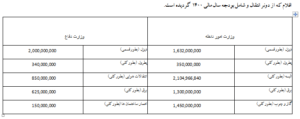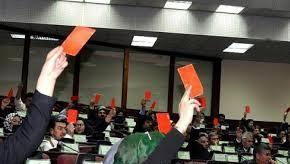KABUL (Pajhwok): Some lawmakers including Wolesi Jirga speaker have held the next fiscal year’s budget plan hostage seeking to remove fund allocations for fuel supplies to the ministries of interior and defense and award their contracts to some specific companies, a source said, but the lower house rejected it.
The Wolesi Jirga has twice rejected the budget plan for 1400 fiscal year due to what lawmakers said removal of more than 1,100 provincial projects, increase in budget for emergency codes and imbalanced provincial allocations.
Holding budget for personal interests
A credible government official, who wished to go unnamed, claimed that a number of Wolesi Jirga members including speaker Mir Rahman Rahmani, were trying to halt the budget plan in order to get dropped budget for the fuels supplied to the Ministry of Interior and Ministry of Defense.
The source said fuel was supplied to the two ministries by the Combined Security Transition Command – Afghanistan (CSTC-A) since the last 19 years. The oil supplied to the two ministries was in control of Mir Rahman Rahmani.
The source said Rahmani wanted to remove budget for the oil for the two ministries and again take the contracts from CSTC-A privately.
Transfer of responsibilities to government
Deputy spokesman of the Ministry of Finance (MoF), Farid Nokht, said 3.150 billion afghanis had been allocated for oil purchase for the ministries of interior and defense in the next fiscal year budget because responsibility of security organs should be gradually taken by the Afghan government.
The source said based on financial responsibilities’ transition from donors to the Afghan government, the responsibility of items previously provided by donors would be gradually shifted to the government.
“Based on the plan, the responsibility of around $40 million in 2021, $68 million in 2022 and until 2025, total financial responsibility which amounts to $223 million would be gradually transferred to Afghanistan government,” he said.

The deputy spokesman for the Ministry of Finance did not provide details or comment on whether some lawmakers wanted to exclude the two ministries’ oil expenses from the budget document.
A letter from the CSTC-A, a copy of which is available with Pajhwok, states the Afghan Ministry of Finance should pay for purchase of about 7,324,451 liters of fuel, including a 10 percent increase for winter of 1399 fiscal year for the Ministry of Interior and to allocate about $40 million to the Defense Ministry for diesel fuel in 1400.
The source wrote that according to the plan, the transfer of responsibility for the supply of oils was to be gradually transferred to the Government of Afghanistan, and by the end of 2021, this process will be entirely the responsibility of the government.
A source, who did not want to be named, said the government had included the fuel money in the budget for a reason that would make fuel cheaper and contractors would have to pay taxes.
In the last four years under contracts with CSTC-A, the suppliers did not pay taxes, the source said, also citing the gradual transfer of financial responsibilities from the international community to the Afghan government as another factor behind including the money in the budget.
“It is not possible for the Ministry of Defense and Interior to spend on oil. This movement has started gradually since 2019, and more and more of it should be spent from the national budget year by year.”
The source provided Pajhwok with a table showing the items transferred from the donors and included in the national budget document for FY 1400.

Kamal Nasser Osuli, a member of the Wolesi Jirga, said in an interview with Kabul-based newspaper said that some people whose companies had contracts with the Americans wanted the oil money to be taken out of the 1,400 budget until this money was contracted again through the Americans.
Maryam Sama, another member of the jirga, said that the second rejection of the budget document was never aimed at reform. “Some do not approve the budget for the benefit of the people and balance, but for getting points and projects worth millions.
“I agree with the reform and balance of budgets in all provinces, without discrimination, but I do not accept what makes thieves fatter.”
Conspiracy to confuse the public mind
Fahim Kargar, head of the office of Mir Rahman Rahmani, called the allegations as baseless and said the government was using such rumors to confuse the public. He added that any source who claims that the budget document has been taken hostage due to the personal wishes of some lawmakers and the speaker must prove it with document and provide evidence.
Otherwise, he said, with such statements and conspiracies, the government will not be able to pass the budget document from the Wolesi Jirga.
Mir Afghan Safi, chairman of Wolesi Jirga’s Finance and Budget Commission, also said that not only the speaker, but also no member of the Wolesi Jirga was interested in cutting off the fuel expenditures of the Ministries of Defense and Interior.
Mds/ma







GET IN TOUCH
NEWSLETTER
SUGGEST A STORY
PAJHWOK MOBILE APP